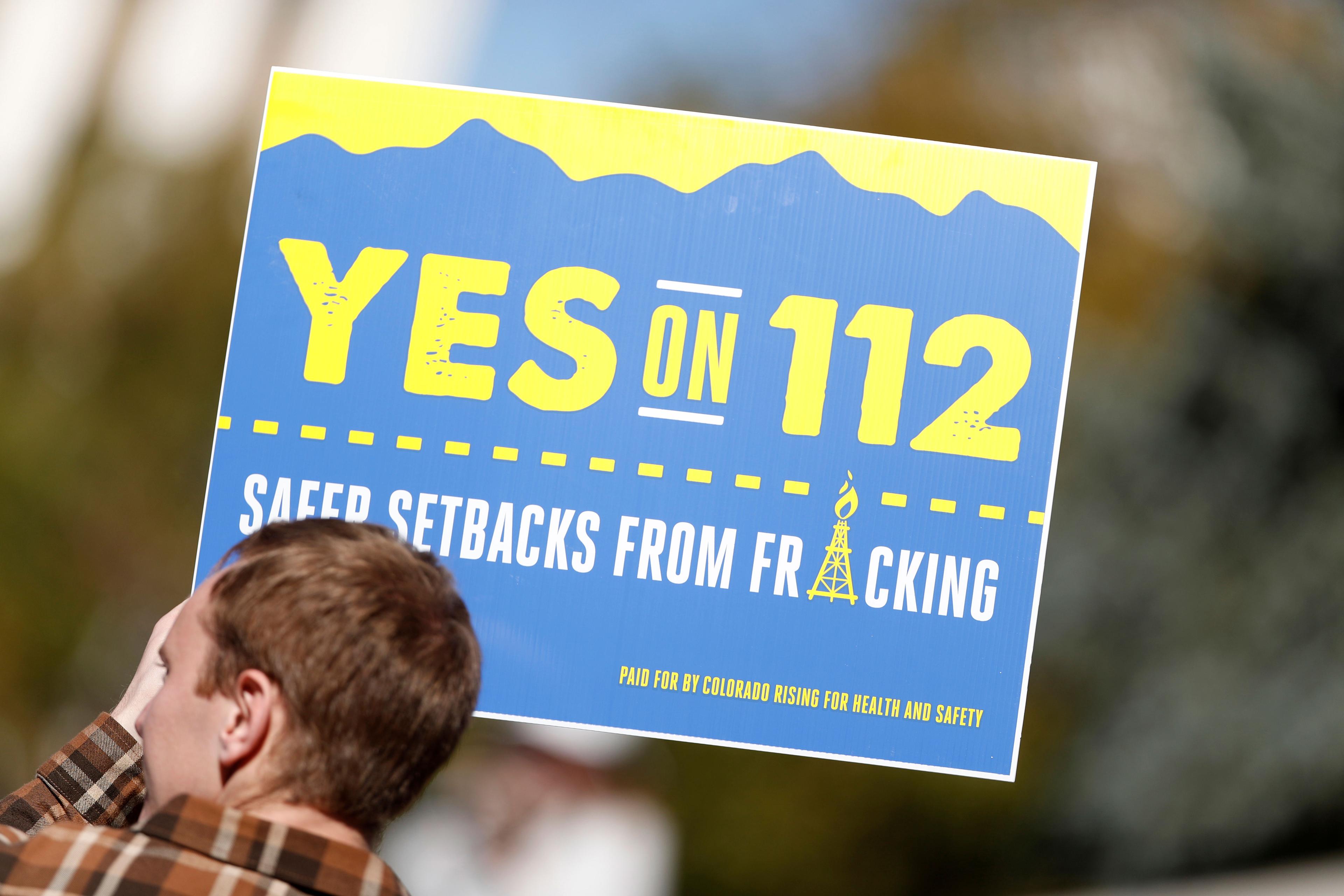

Coloradans are mulling whether to tightly restrict where new oil and gas wells can be drilled, with Tuesday's vote marking the latest chapter in a long, bitter and expensive debate that could have a ripple effect in other energy rich states.
Proposition 112 requires that new wells be at least 2,500 feet from occupied buildings and "vulnerable areas" such as parks, creeks and irrigation canals. It also allows local governments to require even longer setbacks.
The state, which ranks seventh in the nation in domestic oil production and fifth in natural gas production, currently requires setbacks of 500 feet from homes and 1,000 feet from high-occupancy buildings such as hospitals and schools.
"First and foremost, the intent of this ballot measure is to ban oil and gas development in the state," said Karen Crummy, a spokeswoman for the industry funded group Protect Colorado. "There's no proof that a 2,500-foot setback would have any greater protection than we have now. It's kind of a number they picked out of a hat."
Analysts with the Colorado Oil and Gas Conservation Commission, which regulates the industry, say the measure will put about 85 percent of non-federal land in the state off-limits to drilling and will prevent energy development on large swaths along the Front Range urban corridor — a conclusion supporters of the proposal say is overstated and misleading.
The proposal doesn't apply to federal land, which makes up about 36 percent of the state.
Protect Colorado, which has raised nearly $38 million in the fight compared to only about $1 million by the proposition's supporters, warns that if it passes, other businesses that rely on the oil and gas industry — from restaurants to construction companies to hotels — also will take a hit.
- You’ve Got Prop 112 Questions. No Worries. We’ve Got Prop 112 Answers
A consortium of business groups released a study in July concluding that by 2030, there would be up to 147,800 fewer jobs in Colorado, up to $1.1 billion in lost tax revenue for state and local governments and up to $141 billion in lost oil and gas production if the measure passes.
But the dire warnings didn't stop backers from collecting an estimated 123,000 valid signatures to put the proposal on the ballot. They argue bigger setbacks will better protect people and the environment and will give property owners more certainty about the location of new wells.
Anne Lee Foster with the group Colorado Rising said the predicted effect on jobs is "grossly overestimated," and the state report concluding that most non-federal land would be off limits doesn't account for directional drilling.
Directional drilling, which is often more difficult and expensive, involves boring underground horizontally and could be used to access pockets of gas from beyond a setback.
"It's not a ban. It's not going to shut down the industry. They'll still be able to extract minerals," said Foster, noting that Colorado has about 55,000 active wells that are not affected by the proposal. "The numbers are wildly exaggerated. It's scare tactics to avoid even the simplest of safety regulations."
She points to an analysis by Peter Maniloff, an assistant professor of economics at Colorado School of Mines who studies energy and environmental policy. Maniloff concluded that 42 percent of non-federal lands would still be available for new drilling if the proposition passes, assuming operators could drill up to a mile horizontally from any location.
Proposition 112 is the result of seven years of work that included organizing at the state and local level, lawsuits, several failed attempts to get the issue of the ballot and a trip to the Colorado Supreme Court. It gained traction as more and more people moved into once isolated areas dotted by wells and crisscrossed by pipelines, and some analysts say the newfound momentum could bleed into other states that also are dealing with similar conflicts.
"It wouldn't surprise me if some of those states that maybe move a little more purple — the Ohios and Pennsylvanias out there versus Texas — might be looking at this a little more or seeing the potential for these types of issues to arise," said Tanya Heikkila, a University of Colorado-Denver professor who has been studying the oil and gas industry for about six years.
She added that national environmental groups are likely paying close attention to what happens Tuesday and thinking about how to push for similar limits in other states, especially where oil and gas walks up against urban areas.
Amendment 74
Colorado voters also are considering a companion measure backed by the oil and gas industry that would make it easier for property owners to seek compensation from the government for actions that diminish their property's value.
Supporters argue that Amendment 74 could be used if expanded setbacks prevent drilling for oil and gas. But critics warned it would unleash litigation involving a wide variety of claims, including zoning changes, and taxpayers would have to foot the bill.
"It's almost like anything government does that could potentially impact the value of someone's property, they would have a case to request compensation for that," said Heikkila, who describe the possible passage of the amendment as a political nightmare. "This could be the full-employment law for property lawyers."
Heikkila initially thought neither of the initiatives would pass, but seeing the intensity of the television ads and the politics on both sides, she said, "I honestly think it's a coin toss at this point."
Read More: Ag (And Energy) See New Protection In Amendment 74; Gov’ts See A ‘Wolf In Sheep’s Clothing’







